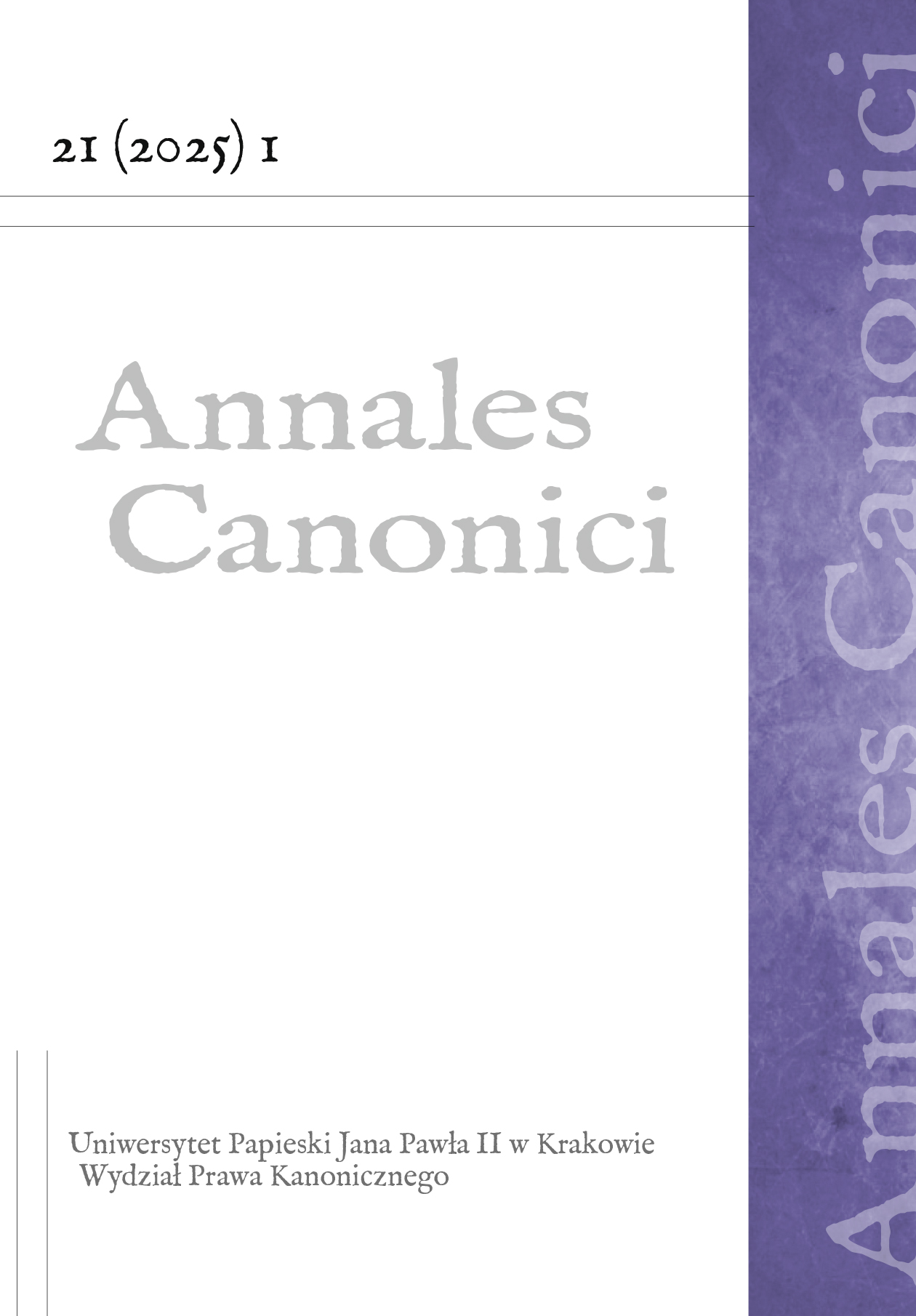Rudimental studies of natural law in the teachings of Popes Benedict XVI and Francis
DOI:
https://doi.org/10.15633/acan.21106Keywords:
natural law, encyclicals, apostolic exhortations, Benedict XVI, FrancisAbstract
One of the sources of law, both canonical and civil, is natural law. This article is an attempt to extract the teachings about the law inherent to human nature, contained in the encyclicals and apostolic exhortations written by Popes Benedict XVI and Francis. Contemporary papal teachings contain a lot of information about the Church’s understanding of natural law and ways of interpreting it. Benedict XVI and Francis also point to examples of specific norms to be interpreted with the help of practical reason. The method of argumentation referring to natural law may be the foundation of dialogue with non-Christians and may indirectly influence the creation of fairer civil law.
References
Benedictus PP. XVI, Nuntius recurrente Internationali Die Alimoniæ dicato 2007, 04.10.2007, „Acta Apostolicæ Sedis” 99 (2007), s. 933–935.
Benedykt XVI, Adhortacja apostolska Africæ munus, 19.11.2011.
Benedykt XVI, Adhortacja apostolska Ecclesia in Medio Oriente, 14.09.2012.
Benedykt XVI, Adhortacja apostolska Sacramentum caritatis, 22.02.2007.
Benedykt XVI, Adhortacja apostolska Verbum Domini, 30.09.2010.
Benedykt XVI, Encyklika Caritas in veritate, 29.09.2009.
Benedykt XVI, Encyklika Deus caritas est, 25.12.2005.
Concilium Vaticanum Primum, Constitutio dogmatica Dei Filius, 24.04.1870, „Acta Sanctæ Sedis” 5 (1969–1970), s. 481–493.
Dłubacz W., Natura czy naturalizm?, w: Substancja, natura, prawo naturalne, red. A. Maryniarczyk, K. Stępień, P. Gondek, Lublin 2006, s. 205–222.
Franciszek, Adhortacja apostolska Amoris lætitia, 19.03.2016.
Franciszek, Adhortacja apostolska Gaudete et exsultate, 19.03.2018.
Franciszek, Encylika Fratelli tutti, 03.10.2020.
Franciszek, Encylika Laudato si’, 24.05.2015.
Franciszek, Encylika Lumen fidei, 29.06.2013.
Gałkowski T., Prawo naturalne fundamentem każdego prawa?, „Annales Canonici” 7 (2011), s. 5–17, https://doi.org/10.15633/ac.0701.
Góralczyk P., Prawo moralne a sumienie w encyklice „Veritatis splendor”, „Studia Theologica Varsaviensia” 32 (1994) nr 1, s. 39–48.
Grocholewski Z., Refleksje na temat prawa, tłum. K. Stopa, Kraków 2009.
Jan Paweł II, Encyklika Centesimus annus, 01.05.1991.
Jan Paweł II, Encyklika Laborem exercens, 14.09.1981.
Jan Paweł II, Encyklika Veritatis splendor, 06.08.1993.
Katechizm Kościoła katolickiego, Poznań 2002.
Kodeks prawa kanonicznego promulgowany przez papieża Jana Pawła II w dniu 25 stycznia 1983 roku. Stan prawny na dzień 18 maja 2022 r. Zaktualizowany przekład na język polski, zatwierdzony przez Konferencję Episkopatu Polski, Poznań 2022.
Kozerska E., Papież Franciszek o prawie, „Miscellanea Historico-Iuridica” 15 (2016) z. 2, s. 343–356, https://doi.org/10.15290/mhi.2016.15.02.22.
Krąpiec M., Człowiek i prawo naturalne, Lublin 1993.
Kroczek P., Encyklika Franciszka „Laudato si’” w perspektywie prawnej, „Studia Oecumenica” 15 (2015), s. 55–68, https://doi.org/10.25167/so.3301.
Krukowski J., Prawo naturalne jako źródło prawa kanonicznego, „Roczniki Nauk Społecznych” 6 (1978), s. 15–26.
Kusiak P., Prawa człowieka w refleksji Benedykta XVI, „Przegląd Religioznawczy” (2016) nr 3, s. 17–25.
Majewski J., Wprowadzenie do teologii dogmatycznej, w: Dogmatyka, red. E. Adamiak, A. Czaja, J. Majewski, t. 1, Warszawa 2005, s. 15–234.
Maryniarczyk A., Dekalog a prawo naturalne, „Człowiek w Kulturze” 3 (1994), s. 133–150.
May W., Introduction to moral theology, Huntington 2003.
Merecki J., Spór o prawo naturalne, Lublin 2001.
Międzynarodowa Komisja Teologiczna, W poszukiwaniu etyki uniwersalnej: nowe spojrzenie na prawo naturalne, tłum. R. Kiełtyka, Kraków 2010.
Paździor S., Przyczyny psychiczne niezdolności osoby do zawarcia małżeństwa w świetle kan. 1095 n. 3, Lublin 2009.
S. Thomae Aquinatis opera omnia iussu impensaque Leonis XIII P. M. edita, t. 7: Prima secundae Summae theologiae, Romae 1892.
Szostek A., Natura, rozum, wolność, Rzym 1990.
Szostek A., Prawo naturalne jako podstawa działania człowieka, w: Substancja, natura, prawo naturalne, red. A. Maryniarczyk, K. Stępień, P. Gondek, Lublin 2006, s. 39–54.
Szymik J., Traktat o Bogu Jedynym, w: Dogmatyka, red. E. Adamiak, A. Czaja, J. Majewski, t. 3, Warszawa 2006, s. 62–74.
Downloads
Published
Issue
Section
License
Copyright (c) 2025 Marcin Szydłowski

This work is licensed under a Creative Commons Attribution 4.0 International License.
The author declares that he owns the copyright to the work (article) and that it is not limited in the scope covered by the above declaration and that the work (article) is an original work and does not infringe the copyright of other persons.
The author allows the Pontifical University of John Paul II in Krakow to use the paper free of charge, non-exclusive and unlimited in time by, i.e.:
– keeping in records and reproduction of the copies of the work using printing, reprography, magnetic recording and digital technology;
– trade in the original or copies on which the work has been recorded (introduction to the market, lending or rental of the original or copies, public exhibition, display, as well as making the work available to the public in such a way that everyone can have access to it in a place and at a time chosen by them);
– inclusion of the work in a collective work;
– granting by the Pontifical University of John Paul II in Krakow a Creative Commons Sub-licence Authorship Recognition-Non-commercial Use-No Subsidiaries 3.0 Poland
The Pontifical University of John Paul II in Krakow makes the work available on the Magazine Platform of the university under the Creative Commons Attribution-Non-commercial Use-No Subsidiary Works 3.0 Poland license.
Thus, it entitles all interested parties to use the work under the following conditions:
- the author and the title of the work will be given,
- the place of publication (journal title and internet address of the originally published work) will be indicated,
- the work will be distributed in a non-commercial manner,
- no dependent works will be created.

